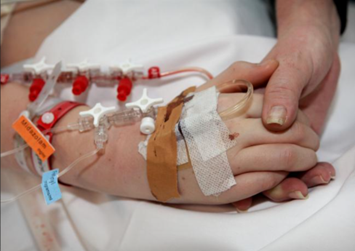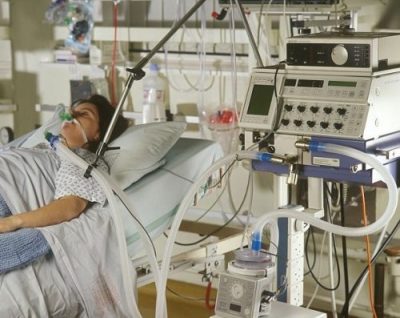Hi, it’s Patrik Hutzel from INTENSIVECAREHOTLINE.COM where we instantly improve the lives for Families of critically ill Patients in Intensive Care, so that you can make informed decisions, have PEACE OF MIND, real power, real control and so that you can influence decision making fast, even if you’re not a doctor or a nurse in Intensive Care!
This is another episode of “YOUR QUESTIONS ANSWERED” and in last week’s episode I answered another question from our readers and the question was
You can check out last week’s question by clicking on the link here.
In this week’s episode of “YOUR QUESTIONS ANSWERED” I want to answer questions from one of my clients, Lloyd, as part of my 1:1 consulting and advocacy service! Lloyd’s mom is in the ICU ventilated, and he is asking how his mom can successfully wean off the ventilator.
How Can My Mom Successfully Wean off the Ventilator in ICU?

“You can also check out previous 1:1 consulting and advocacy sessions with me and Lloyd here.”
Patrik: I’ll tell you what my thoughts on that are. So, they would’ve done a blood gas. After the blood gas, they might have changed the ventilator settings, either decreased or increased support, and they haven’t done a blood gas since. So yes, if they did that, if they changed the ventilator settings after the last blood gas, you would think that the next blood gas would be different.
Lloyd: But we don’t know if they did, because I asked them if they were taking the blood gas tonight when they were taking the blood? And they said that no, they’re just, whenever patients have a fever spikes, they do like the blood culture. So, they weren’t telling me that they were going to take blood gas tonight. But you were saying that’s something that they would have to, I don’t know. They get it from, they have to draw blood in order-
Patrik: They would.
Lloyd: Test it, right?
Patrik: Yes, they would.
Lloyd: Yeah. So, I don’t think they’ve drawn blood today at all or yesterday. Except for yesterday morning for the cultures. So, I don’t know if they have blood gases.
Patrik: Yep. I will tell you why the cultures wouldn’t have anything to do with blood gas. So, when they take cultures, they take cultures from the veins. When they take a blood gas, they take it from the artery.
Lloyd: Oh, okay.
Patrik: There’s a difference unfortunately.
Lloyd: Okay. So, I don’t think they’ve done that.
Patrik: Right.
Lloyd: Is it protocol for them to always take blood gases before they try to do extubation?
Patrik: Not necessarily, but I would argue, especially in your mom’s case where she’s already had one failed extubation, I would say it would be very important to do another blood gas.
Lloyd: Sorry, just-
RECOMMENDED:
Belle: Do you have in your mind a system or fixed schedule to do the blood works? If we convince them to do the blood gas or they’ll do it anyway, what are we looking for?
Patrik: Yep. There is. So, there’s a whole range of numbers you get from blood gas, but probably two numbers that would be very important. One would be PO2. That stands for oxygen pressure in the arteries. PO2 should be above 70 mmHg. And the other one is PCO2, which is the carbon dioxide in the arteries. And that should be between 35 and 45 mmHg. There’s a whole range of other numbers you get from a blood gas, but those would be the two most important numbers to assess effectiveness of ventilation.
Lloyd: Okay.
Belle: Great.
Lloyd: All right. Belle, do you have any questions?
Belle: What about the rapid shallow breathing index? I remember talking about that at one point, but I haven’t heard anybody mention that.
Patrik: I have not heard that term.
Belle: Yeah. The RSBI (Rapid Shallow Breathing Index). I’ve just been reading about it and I’ve seen it mentioned in some papers and stuff.
Patrik: Right.
Belle: I’m doing too much research.
Patrik: There’s nothing wrong with that. I have not heard that term. But I would imagine with your mom having done some belly breathing and probably breathing very fast after her first extubation, I think it’s a valid point, I believe.
Belle: Great.
Lloyd: Yeah. It was only towards the end when her belly, she was breathing fine up until, I want to say two o’clock in the morning or something like that, the last two couple of hours was where it got really intense, the belly breathing. Okay. So, then I guess tomorrow the plan is if they come in, they say they want to do extubation, we ask them for the blood gases and we tell them?
Belle: But I don’t think… You’re making it sound like we have to ask them what to do. I think they’re going to come in with a team and say we’re doing it right now. I don’t think we are going to have… It’s time to do any of what you’re talking about. That’s the problem.
Patrik: Yeah.
Belle: She’s going to come in and…
Patrik: And do it. Yeah. Look, I think it’s a hard one. I would think if they’re so certain that she can’t swallow, I think extubation would be futile, really. Sounds to me like they’re pretty certain that she can’t swallow.
Belle: So that’s a contradiction right there. We could ask the doctor about that.
Patrik: Right.
Belle: If she can’t swallow, why are we doing this?
Patrik: That’s right.
Lloyd: But they’re not sure. They don’t know. We asked them and they said it’s because of where the stroke was in the brain, but they’re not sure if she can’t swallow. I mean, she can yawn. I mean, I see her moving her tongue when she yawns, and she can cough. So are they really… They don’t know for sure.
Patrik: Yeah.
Lloyd: So, are you saying that we’re putting her at risk if we just, should we just go straight to tracheostomy then?
Patrik: I’d say so, because if they think she can’t swallow and they extubate her, I mean next thing that’ll happen is she’ll aspirate. How awake is she? Is she not obeying commands?
Lloyd: Well, she’s tracking, she’s looking. I think she understands when you tell her to blink her eyes, she’ll blink her eyes, she’ll close her eyes. So, I think she understands. That’s the thing. It’s just the rest of her body’s not moving. There was a flicker of, today actually is a flicker of her. They were saying move your fingers. There was a flicker of her moving her fingers.
Patrik: I argue that with her being on the ventilator settings that she’s on, with them having concerns that she’s not able to swallow. I do argue the extubation is too risky. Do you know on what ventilator settings they extubated her last time?
Lloyd: No.
Patrik: Right. Okay.
Lloyd: Yeah, I didn’t take a picture. I didn’t even think to take a picture. Because we thought that everything was going to go according to plan. We didn’t even think that this was going to happen.
Patrik: Right.
Belle: But if the ABG (arterial blood gas) numbers come back really solid tomorrow, that could sway you to think it would be worth the shot?
Patrik: If she can’t swallow, I would say no.
Suggested Links:
Lloyd: But how do we know if she can’t swallow, unless they do the swallow test?
Patrik: Yeah, exactly. Swallow test. Speech.
Belle: Well, they took it out before, and she was swallowing. Right? I mean she was off the tube for quite a few hours, wasn’t she?
Lloyd: Yeah. For 14 hours.
Belle: So, wasn’t she swallowing during that period? I mean, didn’t they already do a test kind of in that period of time? They didn’t say she wasn’t-
Lloyd: That’s a good point.
Belle: Because she couldn’t swallow that.
Lloyd: Yeah, that’s a good point. It was just like when they first, they put a trumpet hose on her nose, because when she was breathing, she was breathing like she was snoring. And so, once they put the trumpet thing in her nose, she was able to breathe fine. And she wasn’t choking or anything. That whole time she didn’t choke when they extubated.
Patrik: Yeah. The reintubation was not caused by her not being able to swallow.
Lloyd: Right.
Patrik: Right. Well, that’s a sign there.
Lloyd: So, I mean, could it have changed from then to now where she would… Whether that…
Patrik: Unless-
Lloyd: I mean, I just…
Patrik: Unless she had another stroke, I would say no.
Lloyd: Yeah, because they put the stent in, so if they put the stent in, chances of her having another stroke are very minimal.
Patrik: Yeah.
Lloyd: So back to what Belle said. Oh, go ahead.
Patrik: Do you have access to the medical records?
Paul: I checked the portal, yes.
Patrik: I would just try to find out what happened there on this last extubation. Would there be a detailed report about it?
Lloyd: Okay.
Belle: Yeah. I don’t remember reading about it. That’s a good question.
Patrik: Right.
Lloyd: Okay. So tomorrow, okay, so again, tomorrow the plan is if it turns out that, I mean, from what we recollect, it obviously wasn’t from the swallowing. So tomorrow, if they come in and they want to do the thing, we ask for the blood gases and we talk to them again to see how successful they think it’s going to be. And then do we opt for the trach if the blood gases are not good.
Patrik: I think-
Lloyd: Or do we ask them to wait another day?
Patrik: I think if the blood gases are no good, yeah, you could wait another day. The 14-day mark is sort of a rough guide and you could say plus minus two days, of course.
Lloyd: But we don’t know if she’s going to get incredibly better within one day.
Patrik: No, you don’t know. Of course you don’t know.
Lloyd: All right. Okay. Belle, Paul, you have any other questions?
Belle: No, I think that’s it. So just in summary, if she gets the trach, it wouldn’t, getting a trach is not the end of the world? I guess in the beginning we were thinking, that it was death getting trach, but that’s what we want to hear.
Patrik: No, it’s definitely not the end of the world. And I think by you not giving consent to a PEG, it’s not a danger of being moved somewhere else quickly where they start from scratch all over again.
Belle: Right. Because if she gets the trach and she’s still on the ventilator, they have to start the weaning process again.
Patrik: Absolutely.
Belle: Okay. I think it’s really a question of how they handle it tomorrow morning. If they come barging in there and they just want to go ahead and do it. I mean, I don’t see how we can stop it at that point. I don’t know what would be the grounds for us staying stop it if they’re…
Patrik: Look to a degree, you can’t stop them from extubating, as long as they are prepared to put the tube back in. As long as they’re prepared to take the steps in case it won’t work out. Her, recovering without a breathing tube would be the best-case scenario.
Belle: Right. Yep.
Lloyd: Okay. So we try. All right.
Belle: And once the tube is out, is there anything they can do to help? They’re saying they’re going to try to assist, make it likely that she’s going to succeed as possible, but the doctor didn’t really make it sound like there was much they could do.
Patrik: Oh, they can. They can try the BiPAP or the CPAP mask. They can try high-flow nasal prongs and they can try physical therapy, chest physiotherapy. So, there’s a number of things they can do. I’ll text that to you, Lloyd.
Lloyd: Okay. Thank you.
Belle: Yeah, that’d be great. We can ask them.
Patrik: Yes. Yep. Because I need to run, I’m afraid. Did you want to go back later tonight, or?
Lloyd: No, I think we’ve kind of exhausted everything. Maybe tomorrow, I guess we might have to-
Belle: We might have to call tomorrow. Arrange the time that you are free tomorrow.
Patrik: Yep. I could probably do first thing tomorrow morning if you like.
Belle: How about 8 in the morning?
Lloyd: Maybe, but shouldn’t we see what happens tomorrow first, Belle?
Patrik: Right.
RECOMMENDED:
Belle: Yeah.
Lloyd: Because we’re neck on neck.
Patrik: Let’s do that. I’ll contact you at 8:00 your time and then we’ll see what we’ll do next.
Lloyd: Okay. Now hopefully we’ll know more by that.
Patrik: Yeah. Okay.
Lloyd: Okay. All right. Thank you so much, Patrik.
Patrik: It’s a great pleasure. Thank you.
Belle: Thank you for your help.
Paul: Thank you.
Patrik: Thank you. Bye-bye.
Belle: Bye.
The 1:1 consulting session will continue in next week’s episode.
How can you become the best advocate for your critically ill loved one, make informed decisions, get peace of mind, control, power and influence quickly, whilst your loved one is critically ill in Intensive Care?
You get to that all important feeling of making informed decisions, get PEACE OF MIND, CONTROL, POWER AND INFLUENCE when you download your FREE “INSTANT IMPACT” report NOW by entering your email below!
In Your FREE “INSTANT IMPACT” report you’ll learn quickly how to make informed decisions, get PEACE OF MIND, real power and real control and how you can influence decision making fast, whilst your loved one is critically ill in Intensive Care! Your FREE “INSTANT IMPACT” Report gives you in-depth insight that you must know whilst your loved one is critically ill or is even dying in Intensive Care!
Sign up and download your FREE “INSTANT IMPACT” REPORT now by entering your email below! In your FREE “INSTANT IMPACT” REPORT you’ll learn how to speak the “secret” Intensive Care language so that the doctors and the nurses know straight away that you are an insider and that you know and understand what’s really happening in Intensive Care! In your FREE report you’ll also discover
- How to ask the doctors and the nurses the right questions
- Discover the many competing interests in Intensive Care and how your critically ill loved one’s treatment may depend on those competing interests
- How to Eliminate fear, frustration, stress, struggle and vulnerability even if your loved one is dying
- 5 mind blowing tips & strategies helping you to get on the right path to making informed decisions, get PEACE OF MIND, control, power and influence in your situation
- You’ll get real world examples that you can easily adapt to you and your critically ill loved one’s situation
- How to stop being intimidated by the Intensive Care team and how you will be seen as equals
- You’ll get crucial ‘behind the scenes’ insight so that you know and understand what is really happening in Intensive Care
- How you need to manage doctors and nurses in Intensive Care (it’s not what you think)
Thank you for tuning into this week’s YOUR QUESTIONS ANSWERED episode and I’ll see you again in another update next week!
Make sure you also check out our “blog” section for more tips and strategies or send me an email to [email protected] with your questions!
Also, have a look at our membership site INTENSIVECARESUPPORT.ORG for families of critically ill Patients in Intensive Care here.
Or you can call us! Find phone numbers on our contact tab.
If you want a medical record review, please click on the link here.
Also check out our Ebook section where you get more Ebooks, Videos and Audio recordings and where you can also get 1:1 counselling/consulting with me via Skype, over the phone or via email by clicking on the products tab!
This is Patrik Hutzel from INTENSIVECAREHOTLINE.COM and I’ll see you again next week with another update!







